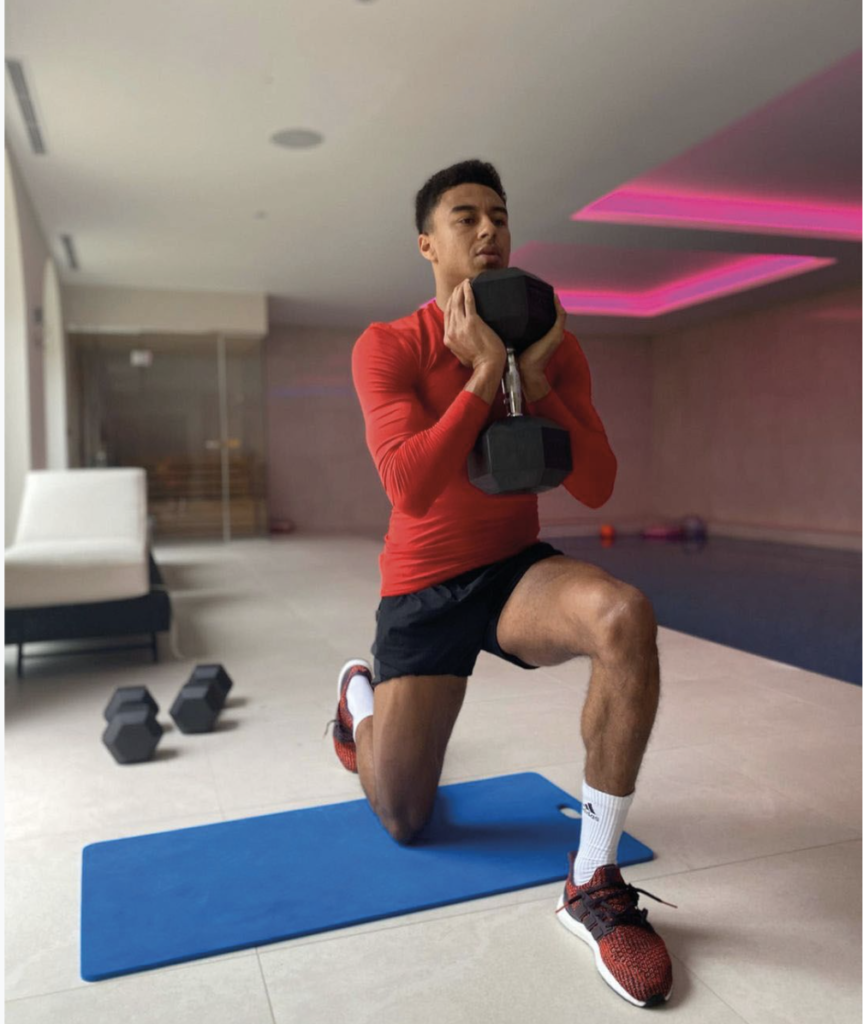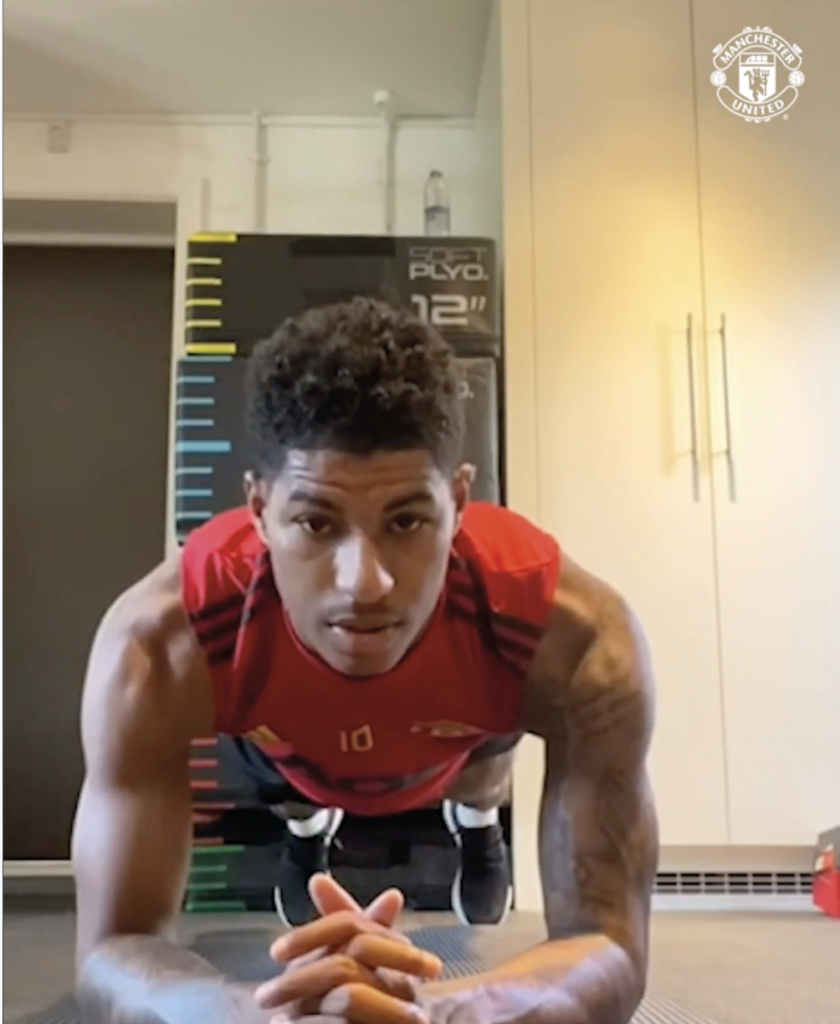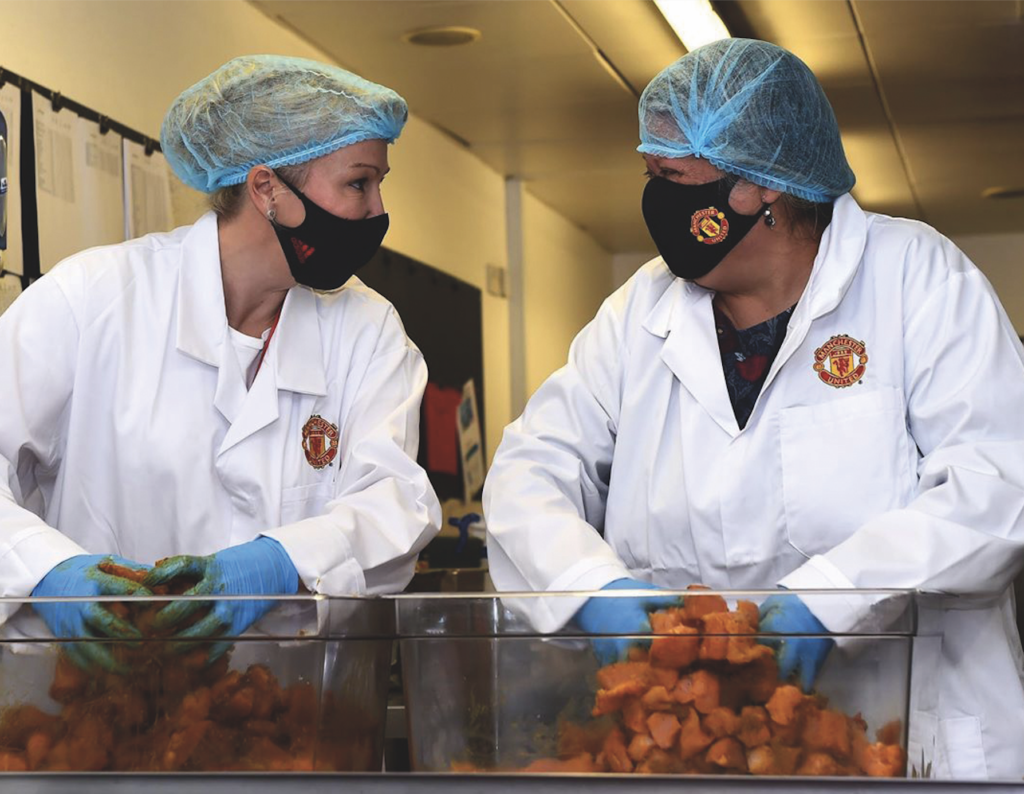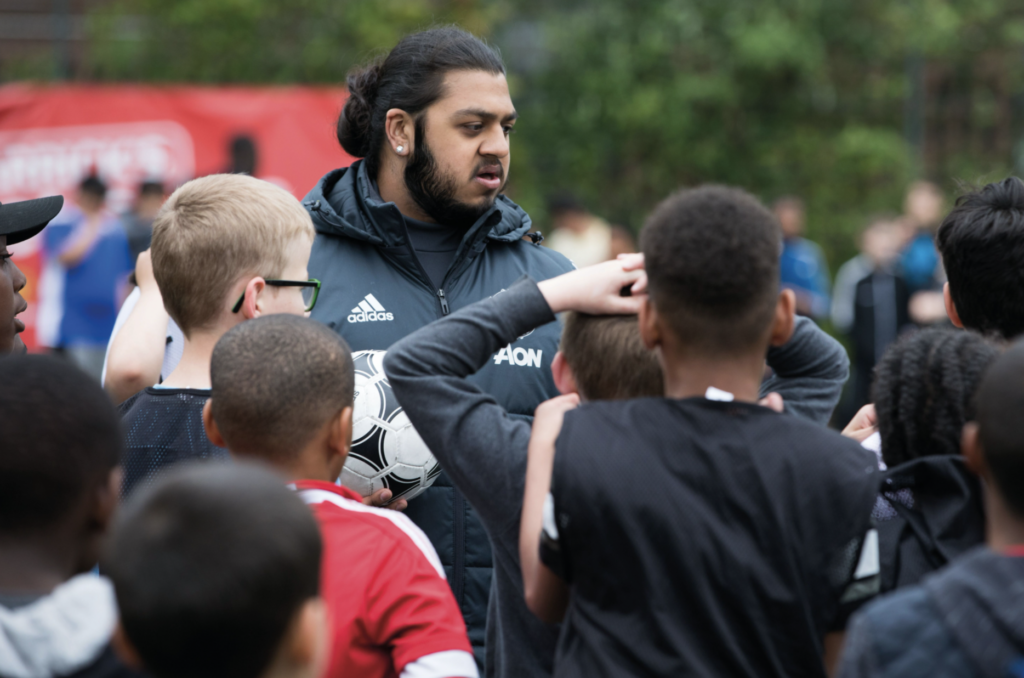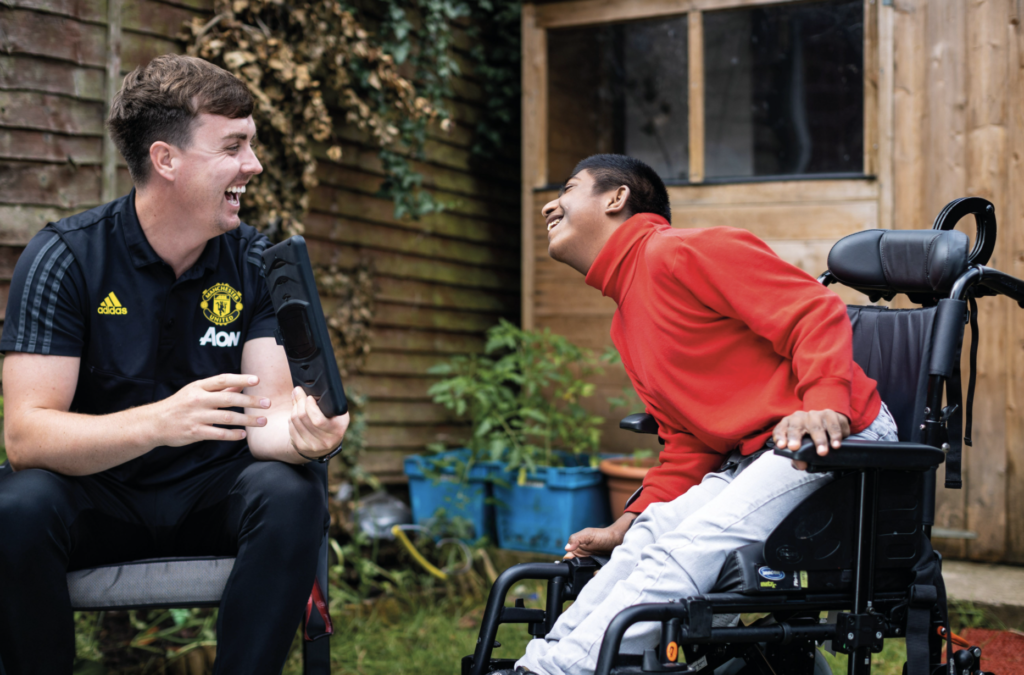January 20, 2021
Overview
Many of the challenges presented by the novel coronavirus (COVID-19) pandemic are
common across organizations. But when your business is running one of the most famous sports teams in the world, the COVID-19 crisis presents some unique hurdles.
For Manchester United, one major obstacle was a soccer season that was interrupted last spring by the pandemic — a schedule that ultimately resumed three months later albeit with empty stands. Beyond the impact on the team’s revenues and its various business partners, Manchester United had to find a way to make sure that when matches did resume, its players were ready to take the pitch.
At the same time, the team’s leadership recognized the importance of addressing the needs of three other essential groups linked to the club: staff, fans and community. Manchester United leaders shared an inside look into how they tackled the impacts of the coronavirus in a series of panel discussions at the 2020 Aon Insight Series.
The pandemic “has been one of the biggest challenges in the club’s history,” says Patrick Stewart, Manchester United’s general counsel. “We are a football club and as a business we depend on football matches being played. For three months, all football in England came to a halt.”
The 2020-21 English Premier League season is underway, but Manchester United is still confronting the pandemic’s challenges. As it does so, however, it’s relying on a valuable tool — data — that’s helping the club make the best possible decisions, meet the needs of stakeholders and ensure the team is ready when fans return to the stands.
“It’s heartbreaking to see some of the wonderful football that’s being played, and when the ball hits the back of the net, there’s only a handful of people clapping from the bench,” Stewart says. “It’s essential that we get fans back as quickly as possible.”
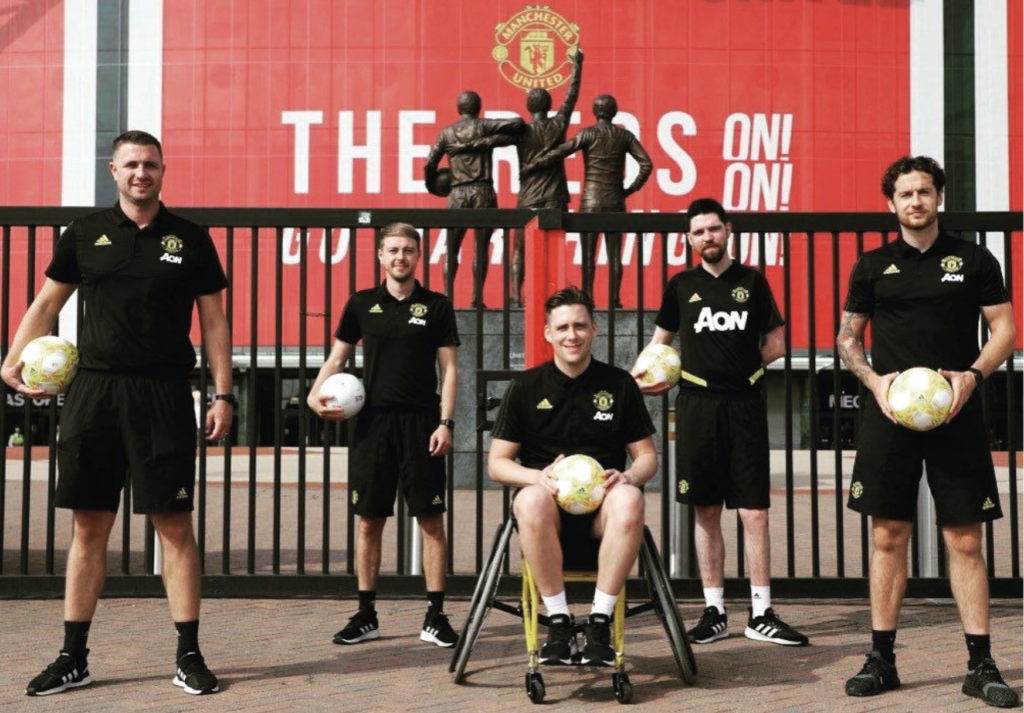
Manchester United Foundation staff outside Old Trafford stadium, Greater Manchester, England.
In Depth
While COVID-19 had an undeniable impact on Manchester United, the organization was fortunate to enter the pandemic in a strong position businesswise. The club relies on three revenue streams: commercial partnerships, and broadcast and ticket revenue.
“But, notwithstanding our resilient business model, the pandemic has still impacted us heavily and it was really important for us to get football back up and running as quickly as possible,” says Stewart.
Through the uncertainty, the club would need to maintain its players’ fitness levels, transition staff members to remote work and support the community. Returning to the pitch involved convincing key stakeholders — players, support staff, fans and government – that it could be done safely. “All of this needed data to support the argument that we were putting forward,” Stewart says.
Keeping Players Fit and Ready Through Lockdown
As Manchester United’s leadership worked to support restarting the season, the team faced another major hurdle: ensuring that distanced players would be ready when playing resumed. Team leaders knew the modified season would have a compressed schedule, heightening the emphasis on fitness.
Jesse Lingard keeps fit with home workouts.
“Having to transition our workforce to home is one thing, but when part of your workforce is an incredibly high-performance unit physically, that creates its own challenges,” says Charlie Brooks, Manchester United’s director of communications.
Data proved critical as coaches and the team’s fitness staff monitored players’ training and nutrition.
Marcus Rashford keeps fit with home workouts.
In addition, the routine of professional sports and athletes typically relies on a constant calendar. COVID-19 changed that. The team looked to innovation — such as a remote players’ 5K treadmill competition — to maintain motivation and consistency. “That created the need to adapt both on the performance side and for the club overall,” says Brooks. “And it was really data-driven decisions that helped us frame that interaction and adaptation.”
Beyond the Players, Helping Other Employees During the Pandemic
While the players’ wellbeing was undeniably essential to Manchester United successfully navigating the pandemic, it was also critical to look after the team’s other employees who were facing their own COVID-19 challenges.
Manchester United staff volunteers cooked meals for National Health
Service staff in the club’s kitchens.
“With our staff, as in every organization facing COVID, internal communications became incredibly important,” Brooks says. “If you want your staff to feel motivated, to feel they’re part of the organization, then making sure you have a communication structure in place to facilitate that, to keep them informed and inspired, is incredibly important.”
Collette Roche, Manchester United’s chief operating officer, notes that the team had to make sure approximately 800 staff were equipped overnight to be able to work safely at home. That involved not just technology, policies, processes and security, but also “the welfare that we needed to put in place for our staff so they could continue to operate.”
The team focused on being flexible and decided early that it would not furlough any staff, paying all employees — including part-time game day staff — while the season shut down.
Caring for Stakeholders Outside the Team
Manchester United had other stakeholders to consider as well: fans, the community and commercial partners.
Staff hosted soccer camps for young fans.
One tool the team used was the Manchester United app, allowing fans to view archived content — and engage with players.
“We put a lot of effort into that digital work to build that connection with all of our fans,” says Cliff Baty, Manchester United’s chief financial officer.
The team looked to support its community as well. “We take very seriously the fact that we’re a big employer,” says Roche. “With that comes the responsibility that we do what we should to protect the local communities.”
Among other measures, the team made wellness calls to vulnerable fans, distributed food parcels and provided over £1 million of support to the community. Staff volunteers cooked meals for National Health Service staff in the club’s kitchens, while the organization made areas available as COVID-19 testing sites.
Harry Maguire takes a break to call elderly fans and check in with them during lockdown.
Getting Fans Back in the Stands
As the club continues to await the return of fans to Manchester United’s Old Trafford stadium, data will again be essential.
“We are convinced we can bring fans back safely and securely,” says Stewart. “We have been using data throughout to support our analysis.”
Manchester United Foundation staff make a home visit to a young fan.
The team has used data and analytics to calculate how many people can safely fit in the stadium while complying with social distancing requirements. It has analyzed data around fans entering and leaving the stadium, and traveling to and from matches on public transportation. It has also considered how best to conduct contact tracing if it turned out someone in the stands had COVID-19.
“We do need a genuine world-class track-and-trace system, something that our government has been striving for since the outbreak of the pandemic. But in order for that to be world class, we as a venue provider need to be collecting good-quality data and be processing that data very smartly,” Stewart says. “Data underpin everything.”
The post How Manchester United Is Using Data To Navigate The Pandemic appeared first on The One Brief.

